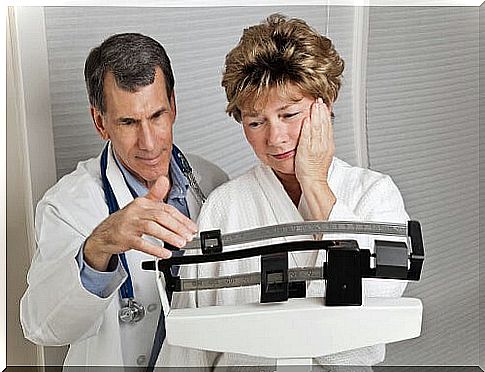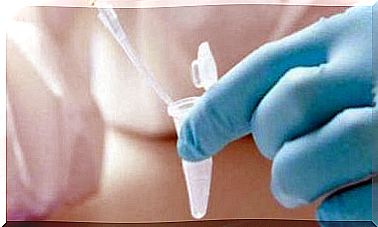Will You Gain Weight During Menopause?

If you are nearing the age of menopause, you may be wondering if you will gain weight during the menopause. First of all, we need to know that menopause is the period in a woman’s life when menstruation stops completely. It often occurs after the age of 45 and is associated with hormonal changes.
At this stage, the ovaries stop producing estrogen and progesterone. A woman is believed to have reached the menopause when she has not had periods for one year. However, it is a process that involves other disturbing physical changes.
One of the main concerns of women during this period relates to the possibility of weight gain. In this article, we will reveal how much truth this popular opinion is. You will also learn what mechanisms are associated with it and what we can do to prevent extra pounds.
And above all, you will find out if you will actually gain weight during the menopause. Don’t miss out on this information!
Do Hormonal Changes Mean You Will Gain Weight During Menopause?
To answer the question of whether you will gain weight during menopause, first of all, you need to remember that there are a number of important hormonal changes during this period. While they can lead to some weight gain as a consequence, the truth is that experts attribute it to the aging process itself.
Muscle mass decreases over the years, especially if you don’t exercise regularly. This loss of active tissue leads to a significant reduction in caloric expenditure. Consequently, slight weight gain may occur if the woman does not change her eating behavior.

A study from the journal Climacteric suggests that “hormonal changes may be associated with weight gain in abdominal fat .” In addition, this study proposes estrogen therapy as a solution to this problem.
However, it also states that more research is needed to confirm the effectiveness of these types of body composition therapies.
How to prevent changes in body composition?
A woman in the menopause, and preferably even earlier, should compensate for hormonal changes and loss of muscle mass to avoid unwanted weight gain. To improve your metabolic rate, strength training to prevent loss of active tissue is best.
In addition, the scientific literature provides that regular exercise in women after menopause are necessary to prevent problems such as osteoporosis. From a nutritional point of view, there are a number of steps you need to take to provide the nutrients your body needs.
However, there should be no energy imbalance.
1. Intermittent fasting
This is a great way to eliminate a large proportion of your daily calories without exerting yourself too much effort. It is best to skip breakfast, because hormonal cycles reduce your appetite in the morning.
In addition, research shows that these types of dietary protocols have been shown to be effective in preventing complex diseases and the occurrence of type 2 diabetes.
2. Reduced carbohydrate intake
Carbohydrates in our diet essentially have an energetic function. The need for this nutrient is reduced in menopausal women. However, if you exercise regularly with a strength exercise plan, you need more nutrients in your diet.
It’s best to get the help of a dietitian to make sure you don’t gain weight during the menopause.
A dietitian will undoubtedly point out the benefits of reducing carbohydrate intake while slightly increasing protein intake. This strategy will help prevent muscle loss.

Recently, low-carbohydrate ketogenic diets have come into fashion. However, following a strict ketogenic diet during the menopause can be difficult in many cases. In addition, fiber deficiencies associated with this type of diet can be a problem for gut health and cause constipation.
However, we can safely follow a low-carbohydrate diet devoid of these drawbacks, if we know how to choose the origin of macronutrients.
Eating whole grains and unprocessed foods will provide the amount of fiber necessary for a mature woman’s body. Moreover, according to various studies, dietary fiber intake plays a role in preventing cardiovascular disease.
3. Choose fresh and seasonal produce
From a hormonal point of view, menopause is an exceptionally delicate stage in life. Therefore , you must ensure that the body is adequately supplied with vitamins, minerals and antioxidants. Not only will you avoid the risk of gaining weight during the menopause, but most of all you will not lose your vitality. To achieve this, there is no better way than fresh food.
By eliminating industrial products from the diet, we will improve the supply of micronutrients and reduce the consumption of trans fatty acids and chemical products. In addition, regularly including fresh fruit and vegetables in your diet will provide you with the amount of antioxidants necessary to fight aging and free radicals.
If you also want to increase the proportion of these nutrients in your diet, remember that the scientific literature lists cranberries, blueberries, and forest fruits as some of the best sources.
In conclusion … will you gain weight during menopause?
The process of changing your body composition during menopause is completely avoidable. It is true that a series of hormonal changes and the aging process can negatively affect fat gain. However, there are methods to successfully compensate for any type of imbalance in the body.
A healthy diet rich in fresh produce, along with regular practice of strength training, will prevent unwanted fat from appearing on your belly even after the age of 45.









